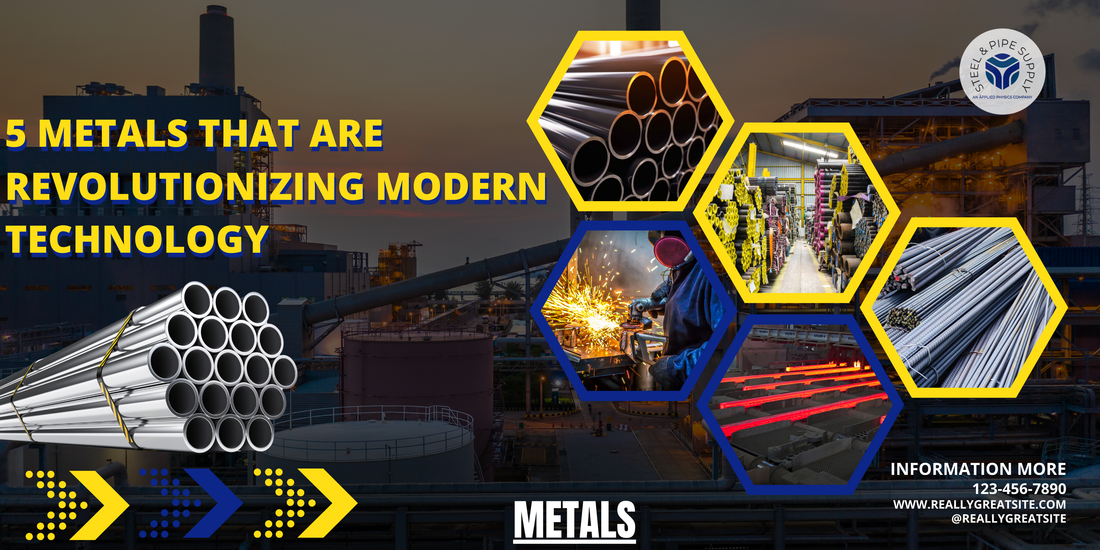
5 Metals That Are Revolutionizing Modern Technology
Share
Introduction
Metals have played a crucial role in shaping the modern world, particularly in the field of technology. From aerospace to medical advancements, energy storage to electric vehicles, and construction to electrical wiring, metals have revolutionized the way we live and work. The unique properties of various metals have made them indispensable in the development of cutting-edge technologies that have transformed our lives.
In this article, we will explore five metals that are at the forefront of modern technological advancements and examine their impact on various industries. Metals have been a fundamental building block of human civilization for thousands of years, but their importance has only grown in recent decades with the rapid advancement of technology. The versatility, durability, and conductivity of metals have made them essential in the development of innovative solutions to some of the most pressing challenges facing humanity.
As we continue to push the boundaries of what is possible, metals will undoubtedly play a central role in shaping the future of technology and driving progress in a wide range of industries.
Key Takeaways
- Metals play a crucial role in revolutionizing modern technology across various industries.
- Titanium is advancing aerospace and medical technologies with its lightweight and corrosion-resistant properties.
- Lithium is powering the future of energy storage and electric vehicles due to its high energy density.
- Rare earth metals are essential in electronics and renewable energy technologies for their unique magnetic and catalytic properties.
- Aluminum has versatile applications in construction, transportation, and packaging due to its lightweight and durable nature.
The Role of Titanium in Advancing Aerospace and Medical Technologies
Titanium is a metal that has revolutionized the aerospace and medical industries with its exceptional strength-to-weight ratio, corrosion resistance, and biocompatibility. In aerospace, titanium is used in the construction of aircraft and spacecraft due to its ability to withstand extreme temperatures and harsh environments. Its low density makes it an ideal material for reducing the weight of aircraft, which in turn improves fuel efficiency and performance.
In the medical field, titanium is used in implants and prosthetics due to its biocompatibility and ability to integrate with the human body without causing adverse reactions. This has led to significant advancements in medical treatments and improved the quality of life for countless patients. The unique properties of titanium have made it an indispensable material in the aerospace and medical industries, driving innovation and pushing the boundaries of what is possible.
As technology continues to advance, titanium will undoubtedly play a crucial role in shaping the future of aerospace and medical technologies, leading to further breakthroughs and improvements in these fields.
How Lithium is Powering the Future of Energy Storage and Electric Vehicles
Lithium has emerged as a critical metal in the development of energy storage solutions and electric vehicles, playing a pivotal role in powering the transition towards sustainable and renewable energy sources. Lithium-ion batteries have become the go-to energy storage solution for a wide range of applications, from smartphones and laptops to electric vehicles and grid-scale energy storage systems. The high energy density and long cycle life of lithium-ion batteries make them an ideal choice for storing renewable energy and powering electric vehicles, helping to reduce our reliance on fossil fuels and mitigate the impact of climate change.
The widespread adoption of lithium-ion batteries has accelerated the growth of the electric vehicle market, leading to significant advancements in battery technology and driving down costs. As we continue to transition towards a more sustainable energy future, lithium will play a central role in enabling this transition by providing reliable and efficient energy storage solutions for a wide range of applications.
The Use of Rare Earth Metals in Electronics and Renewable Energy Technologies
| Metal | Use in Modern Technology |
|---|---|
| Lithium | Used in rechargeable batteries for smartphones, electric vehicles, and energy storage systems. |
| Cobalt | Key component in lithium-ion batteries for electronic devices and electric vehicles. |
| Graphite | Used in lithium-ion batteries, as well as in the production of graphene for various technological applications. |
| Platinum | Utilized in catalytic converters for reducing emissions in vehicles, as well as in fuel cells for clean energy production. |
| Indium | Used in the production of touchscreens, LCD displays, and thin-film solar cells. |
Rare earth metals have become essential components in a wide range of electronic devices and renewable energy technologies, driving innovation and enabling the development of cutting-edge solutions. From smartphones and computers to wind turbines and electric vehicles, rare earth metals are used in a variety of applications due to their unique magnetic and electrical properties. Neodymium, for example, is used in the construction of high-strength magnets that are essential for the operation of electric motors in electric vehicles and wind turbines.
Similarly, dysprosium is used in the production of permanent magnets that are crucial for the efficient operation of electric motors. The increasing demand for rare earth metals has led to concerns about their sustainable supply, as they are primarily mined in a few countries with limited reserves. As we continue to rely on rare earth metals for the development of advanced technologies, it will be essential to explore alternative sources and develop recycling methods to ensure a stable supply for future generations.
Aluminum's Versatile Applications in Construction, Transportation, and Packaging
Aluminum is a versatile metal that has found widespread applications in construction, transportation, packaging, and many other industries due to its lightweight, corrosion resistance, and recyclability. In construction, aluminum is used in the construction of buildings, bridges, and infrastructure due to its strength-to-weight ratio and resistance to corrosion. Its lightweight nature makes it an ideal material for reducing the weight of structures while maintaining structural integrity.
In transportation, aluminum is used in the construction of aircraft, automobiles, and trains due to its lightweight nature, which helps improve fuel efficiency and reduce emissions. Additionally, aluminum is widely used in packaging due to its ability to protect products from moisture, light, and air while being lightweight and recyclable. The versatility of aluminum has made it an indispensable material in a wide range of industries, driving innovation and enabling the development of advanced solutions that improve efficiency and sustainability.
As we continue to push the boundaries of what is possible, aluminum will undoubtedly play a crucial role in shaping the future of construction, transportation, packaging, and many other industries.
The Advantages of Copper in Electrical Wiring and Renewable Energy Systems
Copper is a metal that has been used for centuries due to its excellent electrical conductivity, corrosion resistance, and malleability. In modern times, copper has become an essential material in electrical wiring and renewable energy systems due to its ability to efficiently conduct electricity and withstand harsh environmental conditions. In electrical wiring, copper is used in a wide range of applications due to its low electrical resistance, which helps minimize energy loss during transmission.
Additionally, copper is widely used in renewable energy systems such as solar panels and wind turbines due to its ability to efficiently conduct electricity from renewable sources to power grids.
The unique properties of copper have made it an indispensable material in the development of advanced electrical systems and renewable energy technologies that are essential for transitioning towards a more sustainable energy future. As we continue to rely on copper for these critical applications, it will be essential to explore new mining methods and recycling technologies to ensure a stable supply for future generations.
Conclusion
Metals have played a crucial role in shaping modern technology by enabling the development of cutting-edge solutions that have transformed our lives. From aerospace to medical advancements, energy storage to electric vehicles, construction to electrical wiring, metals have revolutionized the way we live and work by providing essential materials with unique properties that drive innovation and progress. As we continue to push the boundaries of what is possible, metals will undoubtedly play a central role in shaping the future of technology and driving progress in a wide range of industries.It will be essential to explore sustainable mining methods, recycling technologies, and alternative sources to ensure a stable supply of metals for future generations as we continue to rely on them for the development of advanced technologies that improve efficiency and sustainability.

